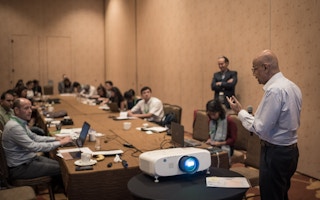With blistering heatwaves and catastrophic typhoons becoming more frequent than ever in Asia, there is growing demand for information about climate change from the world’s most natural disaster-prone region.
To continue reading, subscribe to Eco‑Business.
There's something for everyone. We offer a range of subscription plans.
- Access our stories and receive our Insights Weekly newsletter with the free EB Member plan.
- Unlock unlimited access to our content and archive with EB Circle.
- Publish your content with EB Premium.
According to a survey about climate change communication conducted by social technology company Meta in partnership with Yale University in 2021, a majority of respondents from the region want to gain more knowledge about the devastating effects of global warming.
To help people better understand such complex issues, EB Impact, the sister non-profit organisation of Asia Pacific-based sustainability media organisation Eco-Business, in partnership with Meta, has launched a new platform, the Sustainability Media Academy.
The academy is aimed at providing a first-of-its-kind training platform to equip journalists and content creators across the region with skills to report on climate change and sustainability.
“Sustainability issues affect us daily – across business, government and civil society. The role of the media is so critical in setting the tone for constructive debate and in putting the spotlight on complex issues that we need to address,” said EB Impact founding director Jessica Cheam.
“We hope that through this academy we are able to nurture a generation of journalists and content producers who will play a constructive role in helping the region achieve the Sustainable Development Goals and who are able to fight misinformation and raise the quality of media information around sustainability,” said Cheam, who is also a member of the academy’s advisory board.
Launching its pilot training programme this year, the academy aims to raise the level of trust in information and quality of debate on sustainability issues. It will also enable beneficiaries of the programme to produce high-quality content and equip them with the necessary skill sets and tools to advance sustainable development communication.
In its first year, the course will offer a three-day programme in a hybrid format and will take in 50 beneficiaries from the region. It will feature leading journalism practitioners, sustainability experts, policy makers and industry leaders in its curriculum.
The programme will focus on the fundamentals of journalism on sustainable development issues and content writing; multimedia production, with discussions on how video and graphics can be used in storytelling; and developing beats, to enable aspiring journalists to work on discovering a niche topic or subject area in the field of sustainability.
Sonny Rosenthal, assistant professor of undergraduate studies at the Wee Kim Wee School of Communication and Information, Nanyang Technological University (NTU), said: “The public depends on the media to learn about issues like climate change. Journalists who understand sustainability issues and how to report on them can be a bridge between science and the public. And the Sustainability Media Academy is working to equip journalists with exactly those skills.”
As well as Cheam and Rosenthal, the academy’s board of advisors include Alex Fenby, news partnerships head of Southeast Asia at Meta, Ang Peng Hwa, master of media and communication programme director at Wee Kim Wee School of Communication and Information, NTU, Keith Lin, director of public affairs at Temasek, and Hedwig Rasamah Alfred, assistant chair of undergraduate studies at Wee Kim Wee School of Communication and Information, NTU.
Applications for the programme will open on 4 May 2022 and will close on 20 June.










